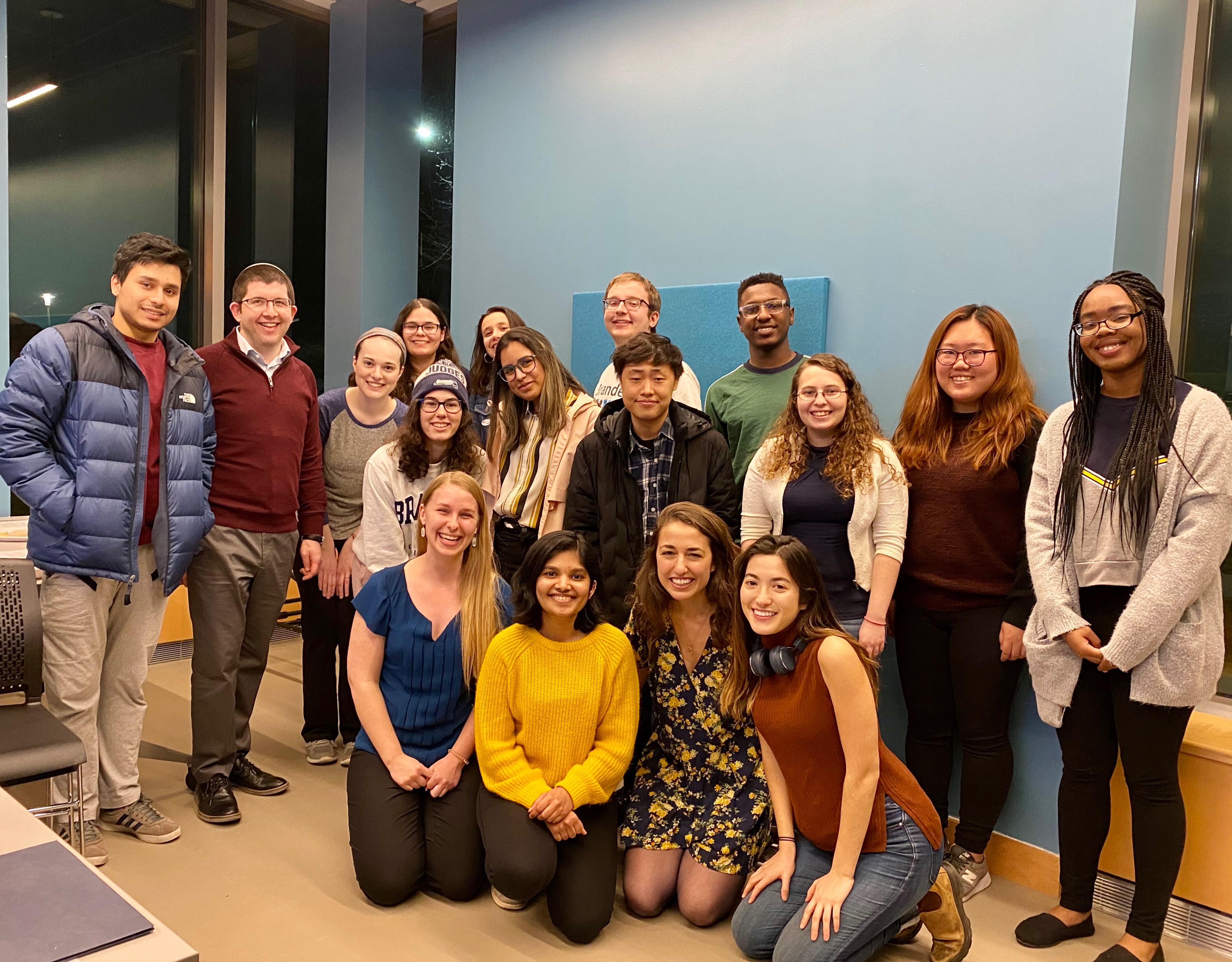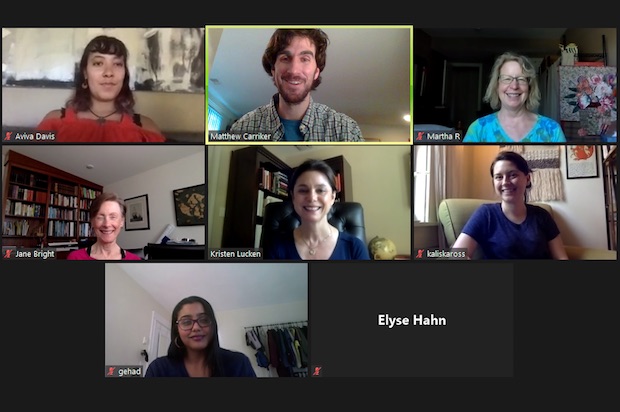How the Brandeis Center for Spiritual Life kept going through COVID-19

A group photo from a Conversations That Matter event held before the COVID-19 pandemic.
The Brandeis Center for Spiritual Life is a hub of interfaith programs that spans much more than traditional religious services. It also serves as a supportive, nonjudgmental resource to help students make decisions, navigate stressful times, and process important life transitions by taking into account each student’s unique value system.
This year the staff grew to include a new director, assistant director, Muslim chaplain and Hindu spiritual advisors, as well as several affiliate chaplains. They are always available to lend a listening ear, and in light of the COVID-19-related challenges, the Center for Spiritual Life has quickly adapted to accommodate students’ changing needs.
“The main thing we’ve tried to do is be responsive to what we’re hearing from students,” said Lara Ericson, assistant director for the Center for Spiritual Life. When classes initially moved online in early March, the staff reached out one-on-one to students who had received support from the Center for Spiritual Life over the past year to check in with them. Taking into account the uncertainty many students may have felt towards the prospect of scheduling a Zoom meeting with a chaplain, the staff took extra measures to reach out to students in order to make them feel more comfortable about the change in platforms.

Affiliate chaplains in the Center for Spiritual Life: Austin Kim Mendy Gould, Sharon Kumar and Marianne Smith
Online “Zen Zone”
The switch to remote learning posed a challenge to some of the events that the Center for Spiritual Life would normally hold in person, but created an opportunity for expansion of other programs. While the Center’s popular Multifaith Dinners have temporarily been put on hold, one of their popular programs, Zen Zone, has proved to be a successful online resource.
Launched in the fall of 2018, Zen Zone is a combined initiative between Matt Carriker, the Protestant chaplain at Brandeis, and a group of students. Held twice a week, Zen Zone is a mindfulness and meditation group that gives students the chance to participate in a guided practice while also checking in with one another and reflecting on their meditative experiences. Some students who attend the meetings have active meditation routines while others are completely new to exploring mindfulness and meditation.
Since remote learning began, Zen Zone has switched to a virtual platform and still holds its meetings twice a week via Zoom. In response to the growing interest in the program since the COVID-19 crisis began, Zen Zone plans to continue its meetings through the end of June so that students can continue to attend these gatherings. In addition to Zoom meetings, the Center for Spiritual Life has expanded its social media presence by posting recorded meditations, reflection sessions, and words of encouragement that are available for students to access online whenever they want to.

The Virtual Zen Zone.
Supporting the Ramadan fast
The Center for Spiritual Life has also made strides in meeting the needs of Muslim students. This year, finals week fell during the Muslim holy month of Ramadan. Harun Spevack, who is finishing his first year as Brandeis’s Muslim chaplain, worked closely with Sultana Bhuiyan ‘21, president of the Brandeis Muslim Student Association, in order to accommodate the Muslim student community.
Bhuiyan remembers that last year during Ramadan the only dining option for Muslim students who were fasting was a bagel and fruit because the dining halls were closed by the time they could break their fasts. She explained that after going sixteen hours without food or water, “We need a warm meal. We usually break our fast with something that is really filling or something that is cultural. The iftar meal is supposed to bring the community together.”
This year, for the small group of Muslim students who remained on campus after the transition to online classes, Spevack collaborated with the Brandeis dining staff to provide students with a way to pick up healthy, culturally-relevant meals that they could bring back to their residence halls. “It was really wonderful to have that relationship with dining services and they were so accommodating,” Ericson said. “Because it was such a small group [of students], they were able to tailor the services so that students would have the appropriate kind of food at the right time of day in order to celebrate Ramadan.”
Bhuiyan commented, “We’re thankful for [the Center for] Spiritual Life and we’re thankful for the Provost. They were able to help us advocate...and get it known to the university that this is something we need.”
For the Muslim students who had returned to their homes around the world, Spevack worked with administration to inform professors about these students’ needs during Ramadan. Due to remote learning, the finals schedule was amended in a way that meant many exams fell in the evening during the time where Muslim students would be breaking their fasts. Spevack ensured that students who needed to take their exams at a different time of day in order to accommodate their fasts were able to do so. Looking forward, Ericson hopes to maintain the same sense of awareness, "that students have a diverse set of religious practices that interact with their academic experience."

Chaplains in the Center for Spiritual Life: Seth Winberg, Lara Ericson, Anjum Biswas, Partha Biswas, Harun Spevack
Maintaining “Conversations that Matter”
Ericson described spirituality as a two-fold phenomenon, one that connects us to the people around us while also grounding us internally and helping us cope with the present moment. Ashley Moushegian is a rising sophomore who can attest to how spirituality has helped her stay positive during this pandemic. “A major purpose of spirituality is [to bring] meaning into your life. So, I’ve been focusing more on what I can do to help other people and finding meaning in the small things. It’s helped me not worry so much.”
Moushegian first became involved with the Center for Spiritual Life through her involvement with the Catholic Student Organization (CSO) for which she is the secretary. It was at a CSO meeting where she first met Ericson, who later encouraged her to sign up for Conversations that Matter, a five-week fellowship that took place earlier this semester.
Fifteen students from varying religious groups as well as students new to spiritual life were selected to pilot this fellowship, which was led by Ericson and Rabbi Seth Winberg - director of Spiritual Life and executive director of Brandeis Hillel - designed to foster a dialogue around life’s fundamental questions, such as “Where do you feel at home?” and “How do you disagree?” “I liked how it [was] an open environment to talk about difficult concepts. It’s very unusual that you would sit down with someone you only know a little bit and start this really in-depth conversation,” Moushegian said about her experience in the fellowship. “It was a great way to expand the spiritual conversations I enjoyed having with people who weren’t necessarily Catholic.”
During such an unprecedented time of uncertainty and grief, many people may be interested in tapping into their own spirituality. For those who have just begun this process, Ericson suggests that you “lean into what works for you.” This may mean attending an online guided practice, listening to a recorded meditation on your own, taking a mindfulness walk, or reaching out to the Center for Spiritual Life for support. “Whether or not [your struggles] feel like they’re as severe or as significant as the challenges other people are facing, they are very real challenges and we experience those in very real ways.”

A "Conversations that Matter" event from earlier in the academic year.
Categories: General





